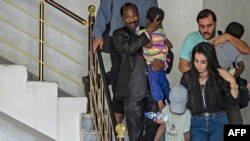Three children born to Nigerian Islamic State (IS) fighters in Syria were handed over to the Nigerian government, Syrian Kurdish officials said Thursday.
The orphaned children, aged 4, 6 and 8, were handed over to a Nigerian government representative in the city of Qamishli in northeast Syria.
“We have been in talks with Nigerian officials about these cases,” said Abdulkarim Omar, co-chair of foreign relations in the SDF-led administration in northeast Syria, who met with a Nigerian official on Thursday.
“They finally decided to come here and take these parentless children,” he told VOA.
This is the first time that an African country has taken back children of Africans who have traveled to Syria to join the terror group, the Kurdish official said.
Omar declined to give information about the number of Nigerians held in northeast Syria, but there are many Nigerians in custody who joined the IS terror group in recent years.
Children and women only
Musa Habib Marika, a representative of Nigeria’s government, said his country is also considering other cases.
“We have asked for a list of Nigerians who are held in camps and prisons to look into their cases,” Marika said during a press conference with Kurdish officials in Qamishli.
But Omar said that Nigeria and other countries can only repatriate children and women of IS fighters.
U.S.-backed Kurdish-led Syrian Democratic Forces (SDF) declared victory over IS in March 2019 after pushing out the group from its last stronghold in eastern Syria.
SDF officials say they are holding more than 1,200 IS militants from nearly 50 countries.
There are also about 20,000 women and 50,000 children of IS fighters who have been settled in an overcrowded camp in northeast Syria, the same sources said.
Kurdish officials say they couldn’t bear the responsibility of dealing with IS fighters alone and that a special international tribunal should be established for crimes they have committed in Syria.
“We can’t try these individuals on our own, so the international community needs to step up its efforts to help us address this international problem,” Kurdish official Omar said.
He added that some Western countries have expressed support for establishing such a court for IS foreign fighters.
IS in Nigeria
On Thursday, IS claimed that its fighters killed 10 Nigerian soldiers and injured several others in an attack on a military base in Borno state. It is the third attack in the area over the last week.
IS said in a statement online that fighters from its West Africa Province (ISWAP) affiliate carried out the attack Wednesday, capturing six military vehicles, weapons and ammunition.
Nigerian officials have not yet commented on the attack.
ISWAP is a splinter of the Boko Haram terrorist group that pledged allegiance to IS leader Abu Bakr al-Baghdadi in 2015.
According the International Crisis Group, ISWAP has 3,500 to 5,000 fighters across Nigeria. The group has reportedly been engaged in deadly attacks against Nigerian military personnel and civilians.
While it is unclear how many Nigerian nationals have joined IS in Syria and Iraq, experts say their potential return could be a challenge for Nigeria since it “is in the midst of a major struggle with Boko Haran and ISWAP.”
“The return of hardened Nigerian fighters, even if they’re fairly small in number, is going to raise all kinds of important policy questions,” said John Campbell, a senior fellow for Africa policy studies at the Council on Foreign Relations in Washington.
He noted that ISWAP drives a degree of prestige among Islamist radicals in Nigeria for its association with IS.
ISWAP “is expanding its influence and the territory it occupies, and even in some areas providing government services, so it’s a real threat to the Nigerian state,” Campbell, a former U.S. Ambassador to Nigeria, told VOA.




